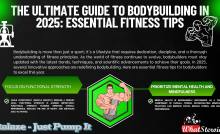Muscle Catabolism and How to Avoid It
The main enemy of any bodybuilder is muscle catabolism. This process in the body breaks down complex structures, such as protein and carbohydrates, into simple amino acids and glucose. Usually, catabolism occurs due to stress, overwork, and physical activity and always leads to the emission of cortisol. Cortisol is a stress hormone. It destroys muscle protein, promotes fat storage, and increases the level of glucose in our blood. Cortisol plays a negative role in the body. The fact that exercise is stressful to the body is the release of hormones, including cortisol.
Amino Acids And Muscle Catabolism
The body must compensate for the deficiency in amino acids used during training. It would be best if you also remedied the lack of glycogen (carbohydrate is fast, which is in our liver and feeding our muscles, because after or during training, you may have sore liver).
Thus, after training, we need to overcome this catabolic effect. It is pretty easy to do by taking sports nutrition. Protein, amino acids, or BCAA perfectly replenish amino acids in the body. In addition, gainer intake also fills the glycogen stores. This is the most practical solution, as it is very convenient after a workout to get a drink shaker and protein-carbohydrate drink.
However, you can overcome the catabolic effect through a regular diet. Suppose a banana or chocolate bar will return to normal glucose levels (in consequence of that and replenish glycogen), and half a liter of the same milk or yogurt fill amino acids and do not give your body the eat your muscles.
What Time Does Muscle Catabolism Occurs?
Muscle catabolism mostly occurs after exercise. Mornings are absolute horror for a bodybuilder. As soon as we wake up, our body needs large quantities of amino acids and glucose—many bodybuilders looking to lose weight run in the morning without getting breakfast.
Must Read: Drink More Water If You Want To Lose Weight And Build Muscle Fast
But this is not a great idea. Your body will not burn fat. Instead, it will successfully break down your muscle protein into amino acids. Thus catabolic effect that occurs every morning will be increased. One of the methods to overcome the catabolic impact can be a hearty breakfast every morning.
Scrambled or boiled eggs, oatmeal with honey, fruit such as orange, banana, or apple, and strong tea are great options for a hearty breakfast. You will get everything your body needs, thus minimizing the release of cortisol and the level of catabolism.
Many people try to overcome morning catabolism by using sports nutrition. But this is not a good idea, as you need ordinary, while one should take supplements during the day. That's why replacing a full breakfast with protein-carbohydrate cocktails is contraindicated.


But what happens during sleeping? Did you know that during sleeping, our body triggers a catabolic process and uses muscle mass to get energy? Further, we will explain why it happens this way. When you sleep, you essentially starve. We all know that we should sleep at least seven hours a day. During this period, you leave your body without food. During the day, if you're at the stage of muscle mass building, you try to eat every 2-3 hours.
Dieting to Prevent Muscle Catabolism
If you stay for more than three hours without eating, your blood sugar levels begin to fall. And all because our brain can only work on sugar (glucose), your body responds to the destruction of muscle proteins and the process of catabolism. It converts the amino acids into glucose for the energy needs of our brain. In other words, our bodies are used as muscle food to feed our brains.
Do not worry too much, since there is a solution to this problem. You have to eat before going to bed. Select a slow-digesting protein for this time. You can choose a protein shake because it provides a slow and steady supply of amino acids for up to seven hours.
That means it will supply your body with amino acids that can be converted into glucose and thus prevent your muscles from breaking apart. If you take about 40 grams of casein protein before bed, it not only prevents muscle breakdown, but you can use other amino acids to stimulate the growth of muscles during sleep.
Also, some alternatives can be appealing to many bodybuilders. One of these is to consume healthy fats, such as two tablespoons of flaxseed oil and two tablespoons of peanut butter. Healthy fats will further slow down the digestion of casein and help maintain insulin sensitivity.
Digestion and Assimilation
Slowing the digestion of carbohydrates, like a cup of oatmeal or two slices of whole-grain bread, will make an excellent addition to the protein and beneficial fats. This choice of food provides a constant flow of glucose to the brain during the night, which will help prevent catabolism, and they will not store it in the form of fat.
What is the optimal duration of training to avoid the catabolism process? It is an astringent question for every bodybuilder who wants to keep their muscle mass. Studies have shown that, after 45 minutes of exercise, without taking any additives in the form of BCAA and glucose, the cortisol level rises sharply. This increase means that after this time, the body begins to eat its muscle to get energy.
That's why it is highly recommended not to make your workout program longer than 45-60 minutes. The good news is the case of taking supplements reduces the cortisol level, and training may be more extended and efficient. As you see, catabolism is the process responsible for the breakdown of muscle tissues.
Must Read: 6 Best Supplements to Increase your Stamina
It is something that all bodybuilders try to avoid since they lose so hard-gained muscle mass. The reverse of this state is anabolism, which builds muscle mass. And this is undoubtedly the process every bodybuilder would like to keep as long as possible.
Dealing With Muscle Catabolism
To avoid the destructive effects of catabolism, you should follow some basic rules like these:
- Do not make your workout program longer than 45-60 minutes. It is the period that is longer if you take additives like BCAA and glucose.
- Avoid not eating for more than 2-3 hours. Schedule at least 5-6 small meals daily, about 2-3 hours between them. Also, eat before going to sleep, so your body gets enough energy over a long period.
- Pre-workout and post-workout meals are essential too. So try not to skip any of them.
Recent Posts
Creatine vs Myostatin: An Expert’s Analysis
Myostatin, a protein encoded by the MSTN gene, acts as a regulator of muscle growth.…
Raloxifene (Evista) 101: A Non-Surgical Solution for Gyno
Raloxifene, a selective estrogen receptor modulator (SERM), is one of the most valuable yet less…
Mastering Bodybuilding in 2025: Top Fitness Tips for Success
Bodybuilding is more than just a sport; it's a lifestyle that requires dedication, discipline, and…
Why Post-Cycle Therapy (PCT) Fails After a Nandrolone Cycle
Nandrolone, or Deca Durabolin, is an injectable anabolic steroid often used by bodybuilders during the…
Counteracting Anabolic Resistance with Adaptogens in Aging Men
As people age, maintaining muscle mass and strength becomes increasingly challenging due to a natural…
Tips on How to Store Peptides and HGH
When peptides are mixed with bacteriostatic water (BAC water), their longevity is highly influenced by…




